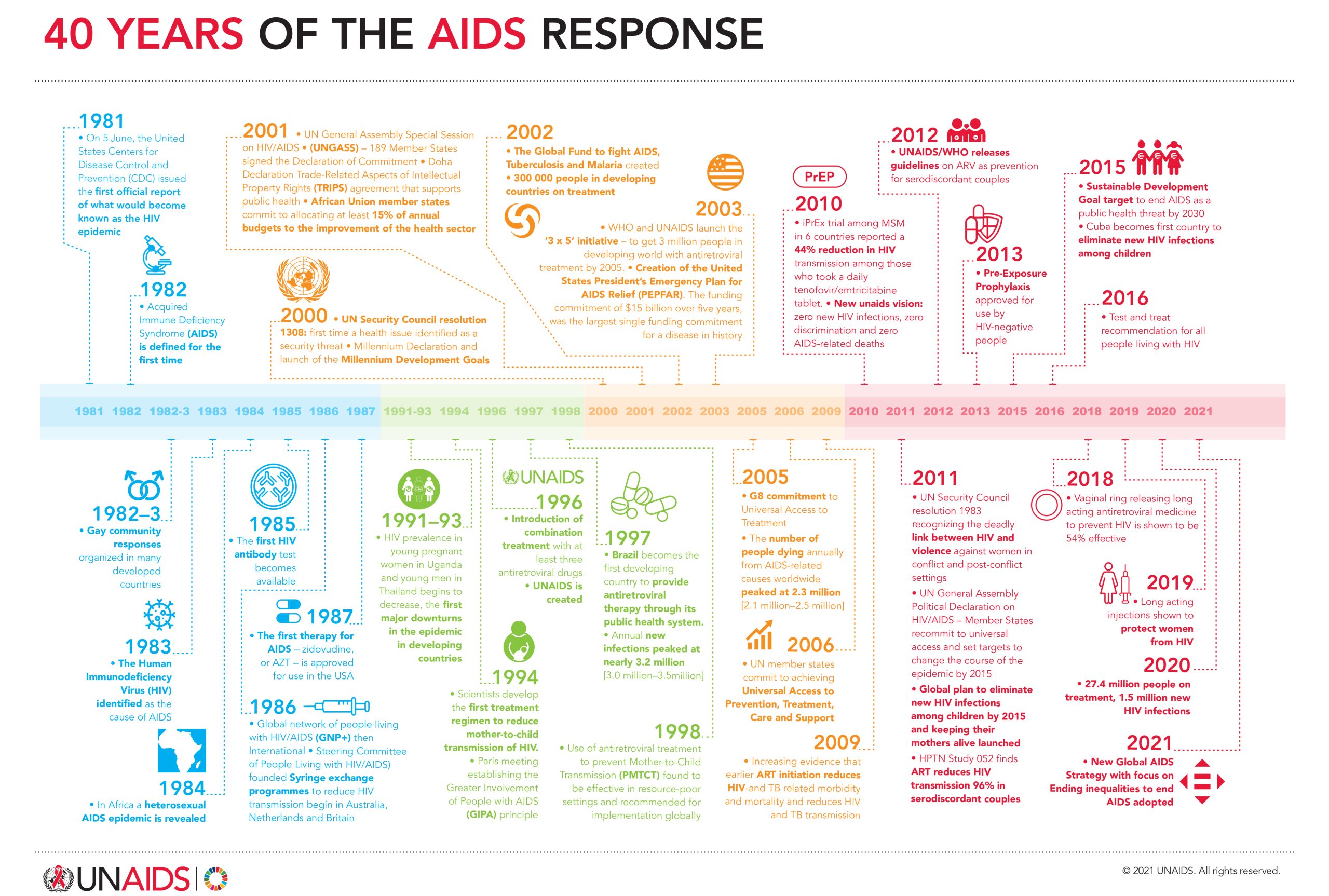What is World AIDS Day?
“Each year, on 1 December, the world commemorates World AIDS Day. People around the world unite to show support for people living with HIV and to remember those who have died from AIDS-related illnesses.
Founded in 1988, World AIDS Day was the first ever international day for global health. Every year, United Nations agencies, governments and civil society join to campaign around specific themes related to HIV.
World AIDS Day remains as relevant today as it’s always been, reminding people and governments that HIV has not gone away. There is still a critical need for increased funding for the AIDS response, to increase awareness of the impact of HIV on people’s lives, to end stigma and discrimination and to improve the quality of life of people living with HIV.”
UNAIDS World AIDS Day Reports
Reports
All UNAIDS publications can be found here.
History of HIV/AIDS
For a detailed timeline of important Canadian and international developments that have occurred over the history of the HIV/AIDS epidemic, please visit CATIE’s webpage, “A history of HIV/AIDS”.
Infographic overview of the AIDS response from 1981-2021.

2024 World AIDS Day Theme: Take the Rights Path
Website: www.unaids.org/en/World_AIDS_Day
2024 Resources:
A list of all previous World AIDS Day themes, resources, and campaign materials can be found here.
CAAN Indigenous AIDS Awareness Week, December 1-7
Communities, Alliances & Networks (CAAN) Mission: “CAAN provides a National forum for Aboriginal Peoples to wholistically address HIV and AIDS, HCV, STBBIs, TB, Mental Health, aging and related co-morbidity issues; promotes a Social Determinants of Health Framework through advocacy; and provides accurate and up to date resources on these issues in a culturally relevant manner for Aboriginal Peoples wherever they reside.” – CAAN
In an effort to continue its support of World AIDS Day, CAAN launches a week-long national public awareness campaign called Indigenous AIDS Awareness Week (IAAW) from December 1-7. This campaign is guided by a steering committee consisting of Indigenous and non-Indigenous partners across Canada.
As stated by CAAN, Indigenous AIDS Awareness Week is an opportunity to:
- Increase awareness and knowledge about HIV/AIDS.
- Establish ongoing prevention and education programs in Indigenous communities.
- Address common attitudes that may interfere with prevention, care, and treatment activities.
- Reduce HIV/AIDS-related stigma and discrimination.
World AIDS Day in Saskatchewan
Each year, HIV awareness and testing events are held in communities across the province to commemorate World AIDS Day on December 1st. In addition to World AIDS Day, Saskatchewan also recognizes AIDS Awareness Week (November 25 – December 1) and Indigenous AIDS Awareness Week (December 1 – 7). Events are often collaborative efforts, with partnerships occurring between community-based organizations, HIV groups, and people living with HIV along with the Saskatchewan Health Authority (SHA), the Northern Inter-Tribal Health Authority (NITHA), and the First Nations Inuit Health Branch (FNIHB).
Saskatchewan Reports and Infographics
Events in Saskatchewan
Below is information about 2024 World AIDS Day, AIDS Awareness Week, and Indigenous AIDS Awareness Week events that are occurring in Saskatchewan.
Note: this is not a comprehensive list of events. If events in your community are not listed, please contact your local organizations or health centre.